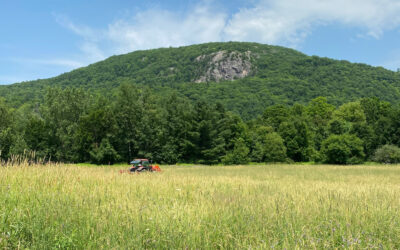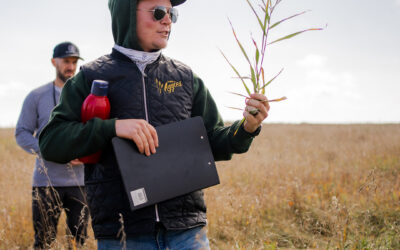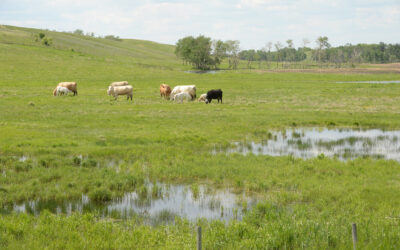The King Farm is a 1,100-acre property in Lambton County, Ontario, that is being stewarded with great skill and care by Mary Ellen King and John King, with a little help from ALUS.
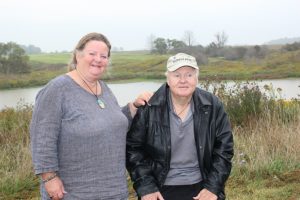
ALUS Lambton participants Mary Ellen King and John King manage many important ALUS projects on their 1,100-acre farm.
A new lease on life for a traditional family farm
The land has been in the King family since the 1830s. Traditionally used to pasture livestock, it was converted to crop farming in 2004. However, when the owners removed the perennial vegetative cover and planted row crops, they realized the soil was highly erodible and decided to implement more sustainable agricultural practices.
Since then, John King and Mary Ellen King have retired a total of 116 acres (47 hectares) of marginal or fragile land from agricultural production, with the goals of restoring the native range land, protecting water and soil resources, and boosting the biodiversity of the farm’s aquatic and terrestrial habitats.
“I’ve seen tremendous changes on our land since we started doing this,” noted Mary Ellen. “I’ve seen a lot more animals, reptiles, birds—when birders come here, they point out species I never knew we had. They get very excited. It’s a new lease on life.”
The Kings have enrolled 27 acres of their land in ALUS
Working with Ontario NativeScape, a division of the Rural Lambton Stewardship Network that has partnered with ALUS Canada to deliver the ALUS program in Lambton County, Ontario, the Kings have enrolled 27 acres of their land in ALUS.
“I like ALUS because it beautifies my world, and because it makes me feel good to give back,” said Mary Ellen King, who is also a member of the ALUS Lambton Partnership Advisory Committee (PAC). “After all, nature provides for us.”
ALUS projects on the King farm include wetlands, riparian buffers, forest habitat, shelterbelts, hedgerows, and native Tall Grass Prairie, all of which to provide habitat, sequester carbon, prevent erosion and protect water quality.
“John and Mary-Ellen are excellent stewards of their land,” says ALUS Lambton program coordinator Lindsay Buchanan. “They have led by example when it comes to implementing environmental best management practices, and I’m glad that their efforts are being recognized, such as through the St. Clair Conservation Award they won in 2016.”
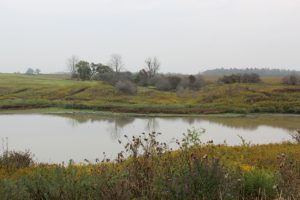
ALUS participants Mary Ellen King and John King have established a series of interconnected wetlands on their farm. They diverted tile drainage outlets into these settlement ponds, so that the rain runoff from 1,075 acres (435 hectares) of farmland, which used to flow directly into Brown’s Creek, is now being cleansed through this effective natural filtration system. Photo: Kevin Gibson
Increasing conservation capacity in our watersheds
“Mary Ellen and John provide great examples of the positive measures farmers can take to enhance green infrastructure on the landscape,” said ALUS Canada’s CEO Bryan Gilvesy. “ALUS is all about increasing conservation capacity in our watersheds by creating resilient agricultural systems.”
To that end, the Kings have protected 4.8 km of riverbanks by planting a riparian buffer zone to help prevent sedimentation and protect water quality.
What’s more, they have established a series of interconnected wetlands and diverted the farm’s tile drainage outlets into these settlement ponds, so that the rain runoff from 1,075 acres (435 hectares) of farmland, which used to flow directly into the Creek, is now being cleansed through this effective natural filtration system.
The King family’s commitment to being stewards of their land is particularly important given the location of their farm. Brown’s Creek, which meanders through their property, is a major tributary of the Sydenham River, which flows into Lake Saint Clair and into the Great Lakes. And the Sydenham River watershed supports the greatest diversity of freshwater mussels in all of Canada—at least 34 species of mussels and 80 species of fish are found here, many of which are considered rare.
Furthermore, the King property is located in “Priority Area 1” of this watershed, where no less than 14 species have been listed by the Committee on the Status of Endangered Wildlife in Canada.
This means that the work being done on the Kings’ farm has a global significance to the conservation of certain species, such as the rayed bean (Villosa fabalis), a freshwater mussel that is no longer found anywhere else in Canada and only remains in a few other locations in North America.
It also means that ALUS projects helping to produce cleaner water in this watershed may also play a role in safeguarding water quality in Lake Erie, which has been significantly degraded due to algal blooms caused by a variety of sources, including agriculture.
“It’s the critters in the creek—mussels and fish—that clear up the water,” says Buchanan. “Everything flows downstream. We work with the willing upstream, and together we are making an impact all the way along.”
After all, said Mary Ellen, “We are only here for a brief second, the blink of an eye. But what we do has ripple effects on everything around us. We can destroy nature, or we can nurture it, leave it better than we found it. The choice is up to us.”
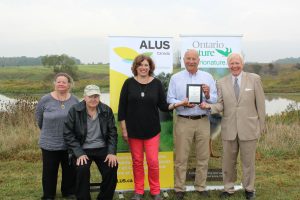
From L to R: Mary Ellen King (ALUS Lambton PAC member), John King (ALUS Lambton participant), Caroline Schultz (ED, Ontario Nature), Bryan Gilvesy (CEO, ALUS Canada, John Fraser (representing Lambton-Kent-Middlesex MPP Monte McNaughton). Photo: Kevin Gibson

